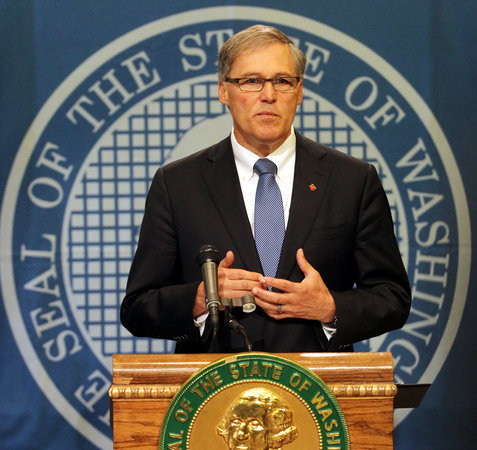
If the Legislature’s second special session that begins Wednesday runs as long as its 30-day allowance, the Capitol might be one of the few state buildings with the lights still on.
Jordan Schrader, The News Tribune
If the Legislature’s second special session that begins Wednesday runs as long as its 30-day allowance, the Capitol might be one of the few state buildings with the lights still on.
The state constitution does not provide for spending money if no budget is in place July 1, but it does mandate some services that would be required to continue.
Contingency plans for entering July without a budget are the topic of ongoing research in Gov. Jay Inslee’s office and a Cabinet meeting set for 4:30 p.m. Wednesday.
“It’s never happened before,” the Democratic governor told reporters Tuesday. “So our lawyers are trying to untangle the skein of the services the state provides and see which ones are constitutionally mandated or mandated by federal law, and which ones are not.
“This would be a major, major disruption of government services, no question about it.”
But Senate Majority Leader Rodney Tom was coolly emphatic Tuesday, saying that a shutdown is not in the offing. “Any talk of a shutdown – it might make great press, but it’s complete nonsense,” he said.
ANSWERS SOUGHT
Inslee said notifications would need to go out to the state’s 60,000 general-government employees about their employment status, which would vary by job title and agency. Many could be furloughed until a budget is signed.
State lawyers are looking into other questions:
• Even if a program is mandatory, would it have to run on a skeleton crew? Would prisons have to be locked down, for example?
• Can other services keep running because they are paid for with federal money or are not subject to appropriation by the Legislature?
• Can much of the Department of Transportation and State Patrol remain at work, since those have already been funded in a separate transportation budget?
• Can lawmakers simply avoid a shutdown by passing a temporary – 30-day, perhaps — budget?
Officials have reviewed 2001 preparations then-Gov. Gary Locke made as lawmakers flirted with a shutdown.
Locke drafted an order asserting his executive power to keep the state taking care of people in its custody, providing federally required social services and keeping the State Patrol on duty, while furloughing less essential state employees.
That year, lawmakers passed a budget June 20, the 17th day of their second special session, and Locke never had to issue the order.
SCHOOLS WAIT
Some deadlines are approaching even before July 1.
Tax refunds start going out Thursday to wealthy estates that sued to recoup estate taxes and won, according to the state Department of Revenue. That tax money goes to schools. The Senate majority has agreed to address the court ruling and hang on to the money, but only if some of its policy proposals are approved.
Saturday is the deadline for school districts to notify employees of potential layoffs. State schools chief Randy Dorn wrote to lawmakers calling for an extension.
Dorn also said districts should be allowed to wait longer to finish their budgets, which are due in August.
State payments to school districts come at the end of each month, so they wouldn’t be threatened right away. But a shutdown at Dorn’s Office of the Superintendent of Public Instruction could affect schools early next month.
ASSIGNING BLAME
Inslee placed the blame squarely on the Senate majority for delay. He argued the Senate hasn’t made concessions even as House Democrats abandoned more than half of their $1.3 billion in proposed tax revenue.
But Tom, a Medina Democrat who leads the mostly Republican caucus controlling the Senate, sees major progress in recent days, including his caucus’ offer to trade about $300 million in new tax money sought by the House for Senate proposals on teacher assignments, workers’ compensation and a cap on growth in noneducation spending.
State government should make plans, Tom said, but he and Speaker Frank Chopp, leader of the Democrats who run the House, have assured each other they would avoid taking state government off a fiscal cliff.
But Chopp’s top lieutenant, House Majority Leader Pat Sullivan, wasn’t so optimistic.
He said lawmakers haven’t been able to “negotiate the details of the budget” because Republicans are holding it hostage for their favored policies.
Of a shutdown, the Covington Democrat said: “I think it’s a legitimate threat that needs to be evaluated.”
While entering a two-year budget cycle with no budget would be a first, a precedent of one sort exists: In August 1951, the state stopped paying bills after the state Supreme Court threw out a budget deemed unconstitutional because it contained a corporate income tax.
In that case, the divided Legislature rushed back to Olympia to pass a new budget that Gov. Arthur Langlie could sign. It still took lawmakers nine days to get a new budget done.
Staff writer Brad Shannon contributed to this report.
